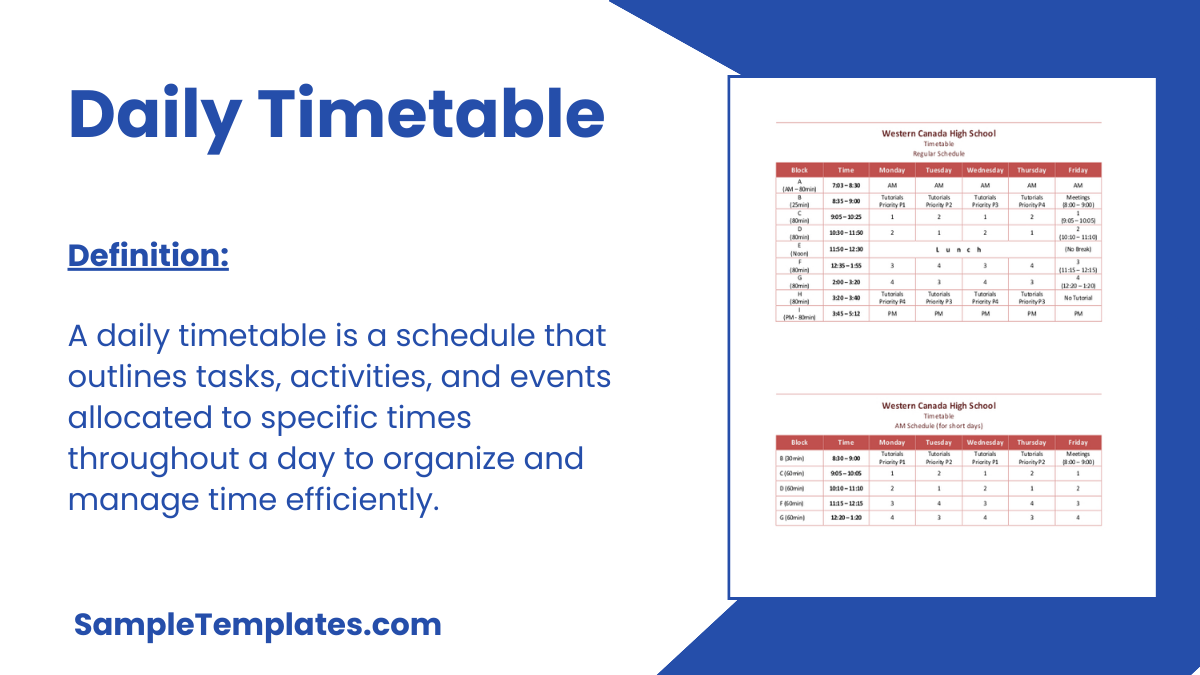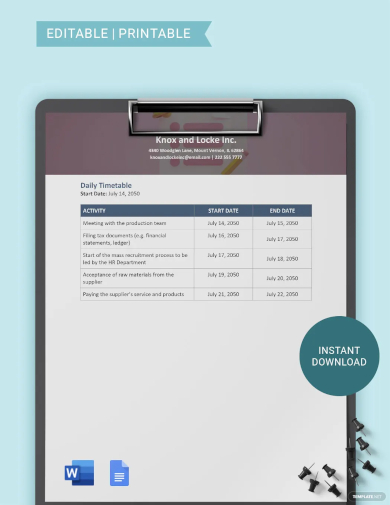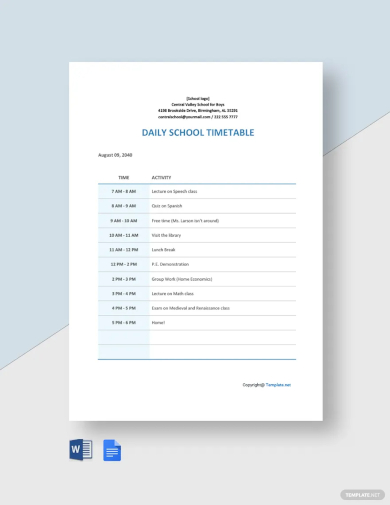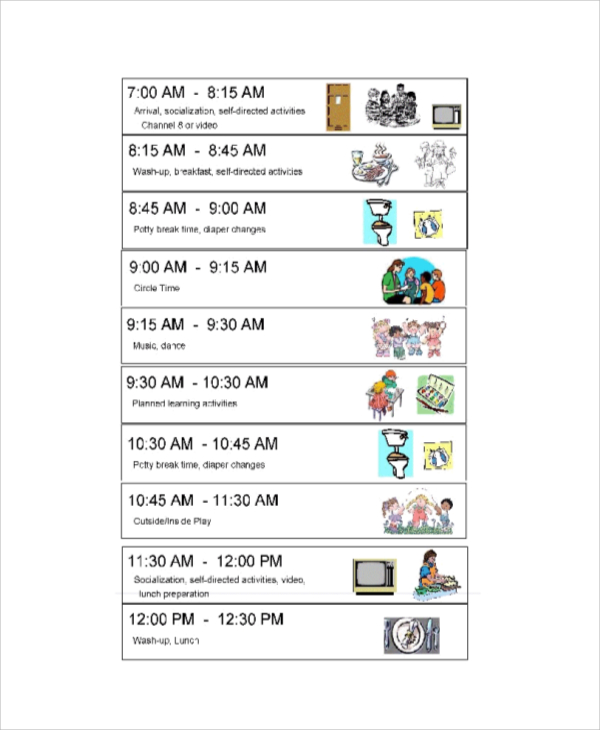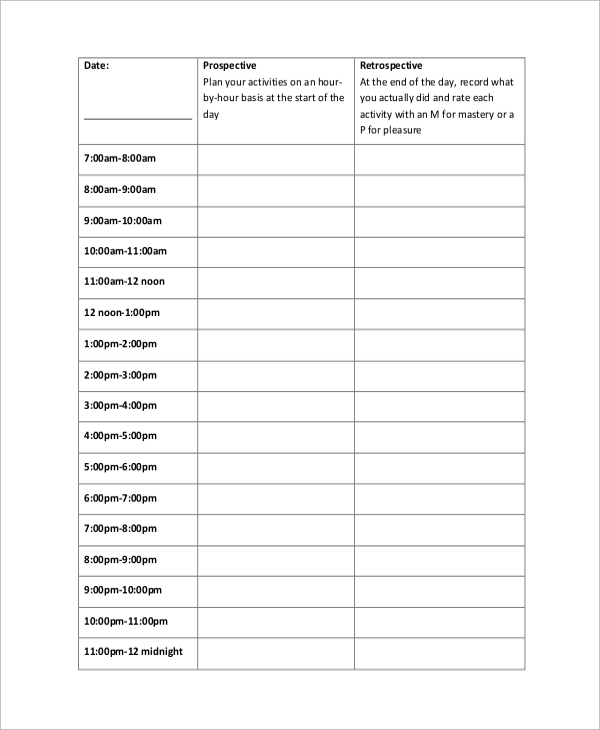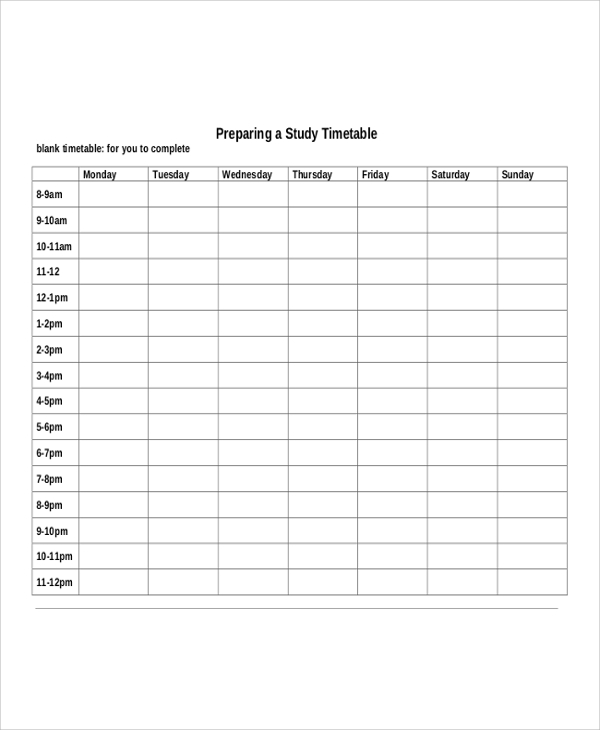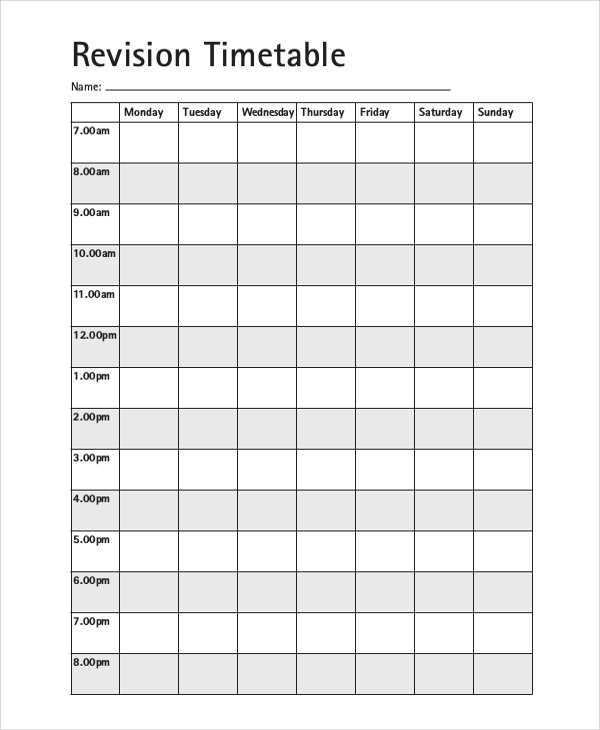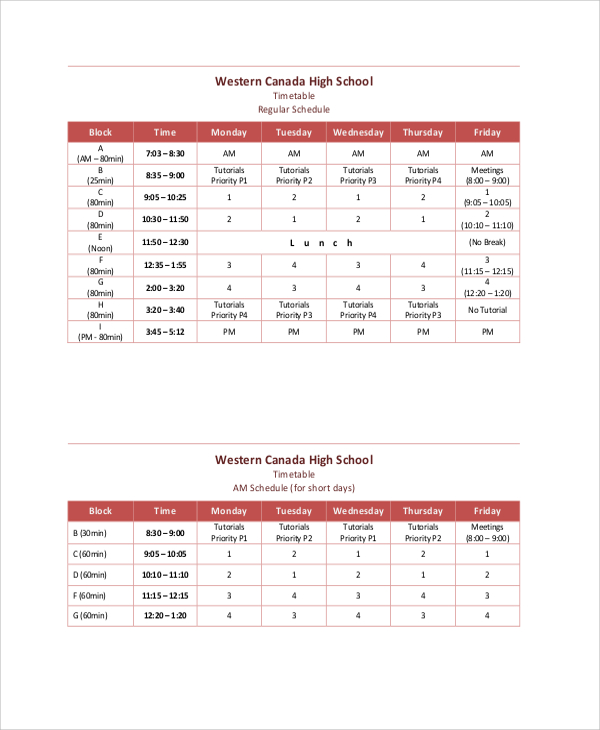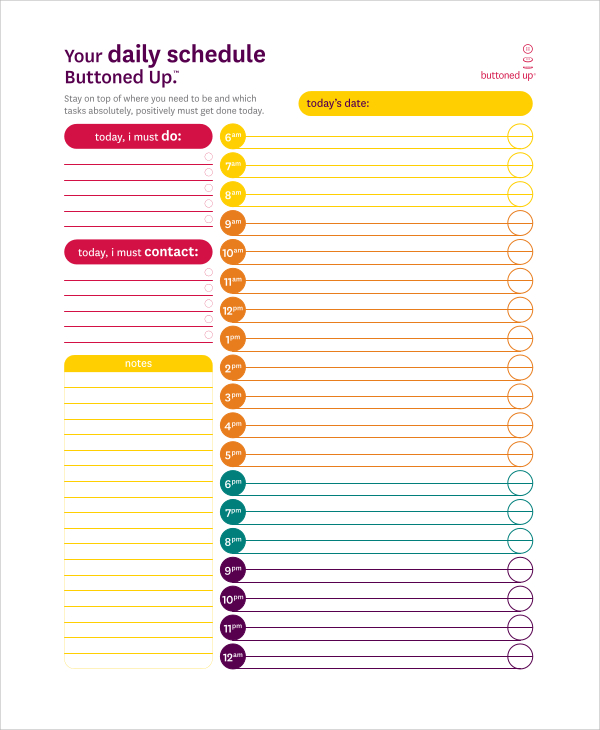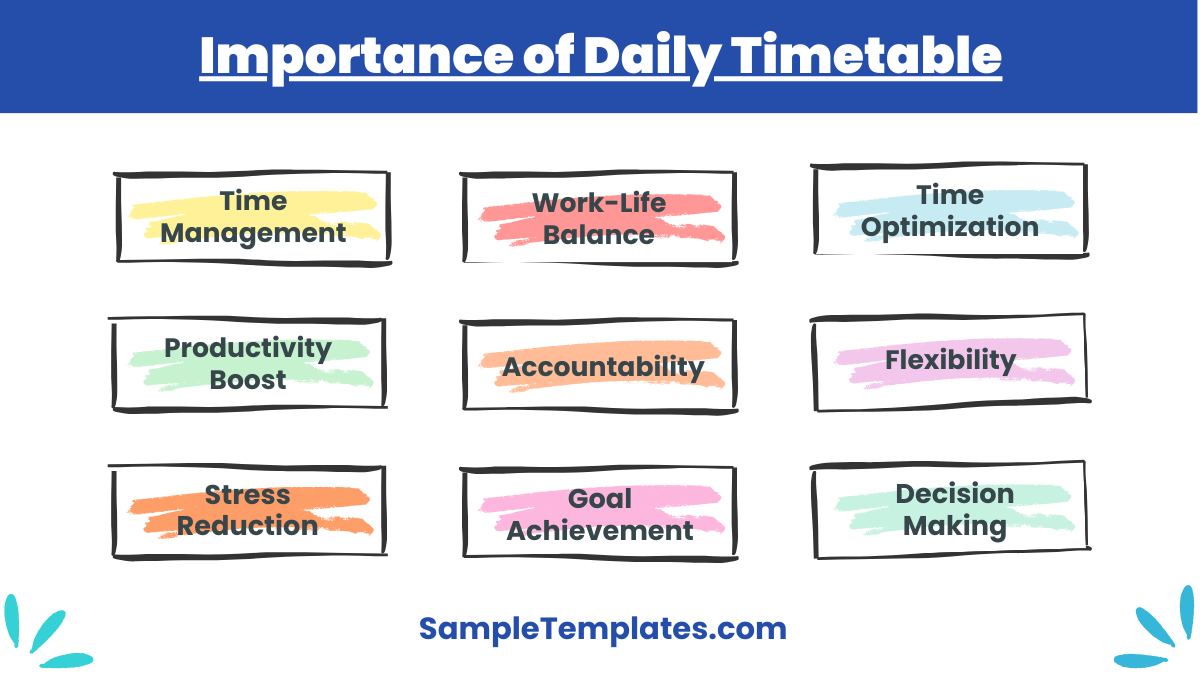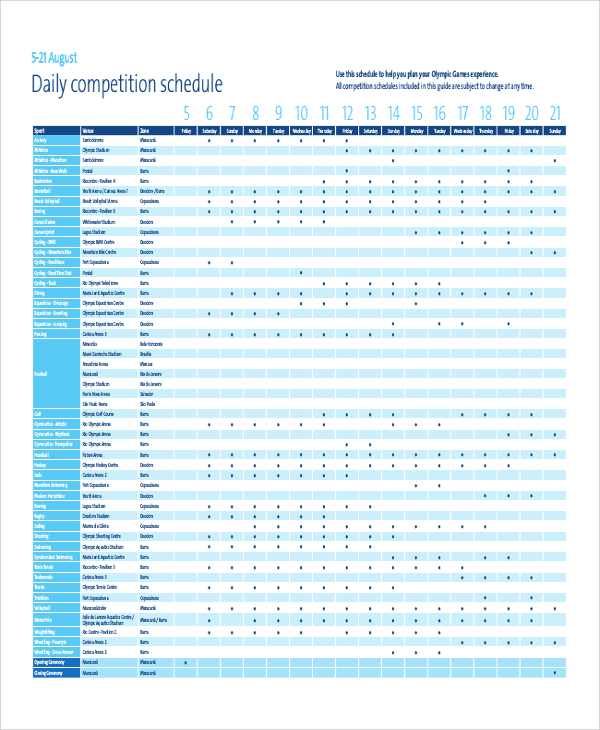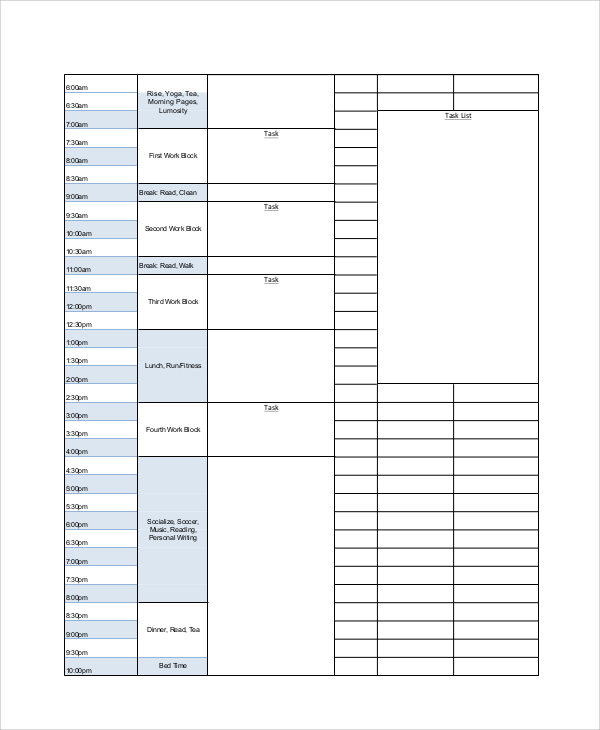Daily timetable helps everyone to be disciplined in their life and never to miss out the tasks one is supposed to be doing every day. It helps in keeping track of daily performance and improving every day to reach the ultimate goal. It does not depend on the activities a person is doing; it is applicable to all the professionals, students, little children as well. The following daily timetable templates have colorful designs to attract your mind for reminding you and encouraging you to do the tasks and rate them accordingly. There are Sample Weekly Timetables according to which you can form your timetable for betterment.
Daily Timetable Template
Free Daily School Timetable Template
Daily Routine Timetable Template
This is a complete daily routine timetable containing multiple samples. These samples will give you an idea about how to form your own routine. It can be done day wise in case different task list are to be performed on different days or it can be done weekly as well if tasks are repetitive in nature. It contains thousands of ideas about daily tasks and it has 37 pages.
How To Make a Daily Timetable?
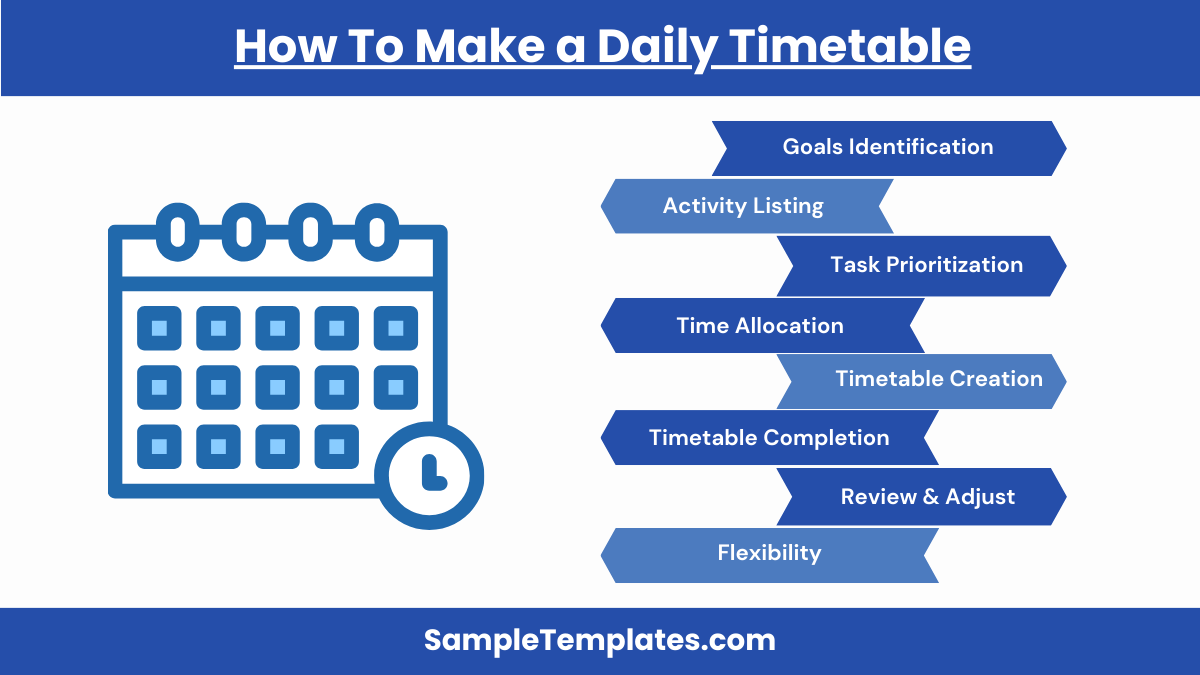
Creating a daily timetable involves understanding your goals, prioritizing tasks, and allocating time effectively. Here’s a step-by-step guide to help you create a daily timetable:
Step-by-Step Guide to Making a Daily Timetable
1. Identify Your Goals
- Long-term Goals: Consider your long-term objectives (e.g., academic success, work projects, personal development).
- Short-term Goals: Break down long-term goals into manageable short-term goals (e.g., completing a chapter, finishing a report).
2. List Your Daily Activities
- Mandatory Activities: Include essential tasks like school/work, meals, commuting, and sleep.
- Optional Activities: Include activities like exercise, hobbies, and socializing.
3. Prioritize Your Tasks
- High Priority: Tasks that must be done today (e.g., deadlines, appointments).
- Medium Priority: Important but not urgent tasks (e.g., studying, exercise).
- Low Priority: Tasks that can be done if time allows (e.g., leisure activities, extra reading).
4. Allocate Time Blocks
- Morning: Typically high energy and focus; allocate for important tasks.
- Afternoon: Allocate for moderate tasks; include a break after lunch.
- Evening: Allocate for relaxation, family time, and lower-priority tasks.
5. Create a Timetable Template
- Use a planner, digital calendar, or a spreadsheet to create your timetable.
- Divide the day into hourly or half-hourly blocks.
6. Fill in Your Timetable
- Fixed Activities: First, add fixed activities like meals, commuting, and sleep.
- High-Priority Tasks: Schedule high-priority tasks during your peak productivity times.
- Medium-Priority Tasks: Fill in medium-priority tasks around your high-priority tasks.
- Low-Priority Tasks: Add low-priority tasks in the remaining slots.
7. Review and Adjust
- Daily Review: At the end of each day, review your timetable to see what worked and what didn’t.
- Weekly Adjustment: Adjust your timetable weekly to accommodate changes in priorities and activities.
8. Be Flexible
- Allow flexibility for unexpected events and tasks that may take longer than expected.
- Be prepared to adjust your timetable as needed.
Sample Daily Activity Timetable Template
This is a perfect format to prepare daily activity timetable. It divides activities into two parts – prospective i.e, sample planning beforehand to perform them according to the sample plan and retrospective i.e to record the activities once they are done to analyze them in future. You can also rate your activities so that you can improve on a daily basis and achieve the long term goals easily.
Daily Study Timetable Template
This is a complete guideline manual to sample form your timetable for daily study. It explains with illustration on how to draw a study timetable that is feasible, it asks several vital questions that must be answered before preparing an effective timetable. It also suggests very important tips and tricks to make your study a fun activity. It provides 3 different and colorful timetable formats for your use in preparing your timetable effortlessly.
Sample Daily Revision Timetable Template
Daily School Timetable Template
Sample Daily Schedule/Timetable Template
Daily Competition Timetable Template
Blank Daily Timetable Template
Usage
A daily timetable helps to prioritize the tasks and break down tasks into parts to complete them effectively. The above mentioned daily schedules and timetable formats are tailor-made to bring the best out of you as there are provisions for rating as well. They also contain guidelines and questionnaires that you must answer before preparing a timetable so that you can have all the aspects in mind while creating an awesome and super effective timetable. They also provide hundreds of ideas around which you can form your hourly, daily and weekly schedule to make your lifestyle disciplined and progressive.
Targeted Audience
The targeted audiences for these daily sample schedule formats, templates, ideas and guidelines are common people irrespective of their age or profession. For the students, it will help them to progress gradually and keep track of tasks and works from hour to hour. Ideas and guidelines will help you to work effectively and make a stunning progress. For a professional person, it will help them to break down the tasks into small parts and achieve them on a daily or hourly basis to achieve the bigger goals and targets.
Benefits of Daily Timetable
Such daily schedules and timetables help in making life easy and comfortable. There will be no headache of missing out or forgetting tasks in hand. One can prepare the schedule beforehand and keep on achieving them from time to time. It helps the managers to schedule a big project work by breaking it down into smaller parts and let different teams achieve them in a specified time period. It helps in making progress in professional and personal life and become more disciplined and avoiding last minute stresses.
1. Improved Time Management
- Prioritization: Helps in identifying and focusing on high-priority tasks.
- Efficiency: Allocates specific time slots for tasks, reducing procrastination.
2. Increased Productivity
- Structure: Provides a clear structure for the day, making it easier to stay on track.
- Goal Setting: Breaks down larger goals into manageable daily tasks, making them more achievable.
3. Reduced Stress
- Predictability: Knowing what to expect each day can reduce anxiety and stress.
- Work-Life Balance: Ensures time is allocated for both work and personal activities, promoting a healthy balance.
4. Better Focus and Concentration
- Dedicated Time Blocks: Allocates specific times for focused work, minimizing distractions.
- Breaks: Regular breaks are scheduled to maintain energy levels and concentration.
5. Enhanced Accountability
- Tracking Progress: Allows you to track your progress and see how much you’ve accomplished.
- Responsibility: Increases personal accountability for completing tasks.
6. Effective Goal Setting
- Short-Term and Long-Term Goals: Facilitates the setting and achieving of both short-term and long-term goals.
- Milestones: Helps in setting and reaching milestones, boosting motivation.
7. Improved Discipline and Habits
- Routine: Establishes a routine that promotes discipline and the development of good habits.
- Consistency: Encourages consistent behavior, which is key to long-term success.
8. Optimized Use of Time
- Identifying Wasted Time: Helps identify and reduce time-wasting activities.
- Maximizing Productivity: Ensures every part of the day is utilized effectively.
9. Work-Life Balance
- Personal Time: Ensures that personal and leisure activities are included in the daily schedule.
- Family and Social Time: Allocates time for family, friends, and social activities, fostering stronger relationships.
10. Flexibility and Adaptability
- Adjustments: Provides a framework that can be adjusted as needed, allowing for flexibility.
- Preparedness: Helps in being better prepared for unexpected events or changes.
11. Improved Health and Well-being
- Regular Exercise: Schedules time for physical activities, promoting better health.
- Adequate Rest: Ensures enough time is allocated for rest and sleep, crucial for overall well-being.
12. Enhanced Motivation
- Sense of Accomplishment: Completing scheduled tasks provides a sense of achievement and boosts morale.
- Clear Vision: Having a clear plan for the day can increase motivation and drive.
The above-listed timetable templates are tailor-made to prepare a study and work related daily and hourly schedule. This sort of timetable helps in formulating and evaluating allotted tasks and thereby improving in future. This helps to keep track of tasks one must do on an hourly to daily basis and it is also useful for any organization to define the tasks employees need to complete every day. You can also see Sample Class Timetables.
What is the perfect daily schedule?
The perfect daily schedule balances work, exercise, meals, and relaxation. Wake early, prioritize tasks, take breaks, and ensure time for personal activities and sufficient sleep.
How do I organize my daily plans?
Organize daily plans by listing tasks, prioritizing them, allocating time blocks, and using a planner or digital calendar. Review and adjust as needed.
What is my timetable quick and simple?
Wake up early, allocate time for work/study, breaks, meals, exercise, and relaxation. Use a planner or calendar app to stay on track.
How do I list my daily routine?
List your daily routine by categorizing activities: wake up, work/study, meals, exercise, breaks, personal time, and bedtime. Schedule each activity with specific time slots.
How do I fill my days?
Fill your days by setting goals, scheduling tasks, incorporating breaks, exercising, pursuing hobbies, and allowing time for relaxation and social interactions. Use a planner for structure.
In conclusion, a well-structured daily timetable enhances productivity and ensures a balanced allocation of time for all activities. By prioritizing tasks and maintaining discipline, individuals can effectively manage their day, reduce stress, and achieve both personal and professional goals efficiently.
If you have any DMCA issues on this post, please contact us!
Related Posts
Ukulele Chord Chart Samples & Templates
Retirement Speech Samples & Templates
Weekly Schedule Samples & Templates
Contractual Agreement Samples & Templates
FREE 9+ Amazing Sample Church Bulletin Templates in PSD | PDF
Sample Business Card Templates
Sample Cashier Job Descriptions
Questionnaire Samples
FREE 10+ Sample HR Resource Templates in PDF
FREE 10+ HR Consulting Business Plan Samples in MS Word | Google Docs | Pages | PDF
FREE 49+ Sample Job Descriptions in PDF | MS Word
FREE 16+ Nonprofit Budget Samples in PDF | MS Word | Excel | Google Docs | Google Sheets | Numbers | Pages
FREE 13+ Academic Calendar Templates in Google Docs | MS Word | Pages | PDF
FREE 10+ How to Create an Executive Summary Samples in Google Docs | MS Word | Pages | PDF
FREE 23+ Sample Event Calendar Templates in PDF | MS Word | Google Docs | Apple Pages
